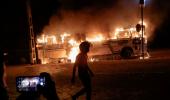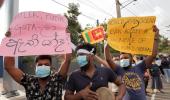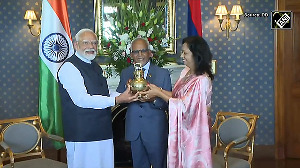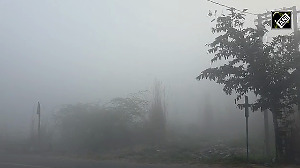Sri Lanka's Opposition parties on Monday rejected President Gotabaya Rajapaksa's invitation to join the proposed unity government as a 'sham' after he fired his brother and Finance Minister Basil Rajapaksa from his post, as protests were held nationwide over the ruling Rajapaksa family's poor handling of the country's worst economic crisis.

President Gotabaya Rajapaksa on Monday fired Basil Rajapaksa from his post and invited the Opposition parties to join a unity Cabinet to tackle the raging public anger against the hardships caused by the economic crisis.
On Sunday night, all 26 cabinet ministers submitted letters of resignation after thousands of people defied a countrywide state of emergency and curfew and joined street protests denouncing the government.
The largest opposition political party, the United People's Force, or Samagi Jana Balavegaya, immediately rejected the president's proposal of a unity government and termed this spate of resignations a 'sham'.
Party leader Sajith Premadasa said he wished to see a political model that works.
'We want resignations and then we want a political model that works. A new Sri Lanka will begin with stronger institutions and not just a change in leadership. An interim government is nothing but internal party politics,' he tweeted.
Mano Ganesan, a Tamil leader from the Opposition said his party Tamil People's Alliance and the main Muslim party Sri Lanka Muslim Congress also on the opposition will also not join the unity government.
President Gotabaya Rajapaksa named just four Cabinet members after the entire Cabinet other than president Mahinda Rajapaksa resigned on Sunday night.
All 26 cabinet ministers handed in their resignations after thousands of people defied a countrywide state of emergency and curfew and joined street protests denouncing the government.
Following the cabinet's resignation Rajapaksa made an open invitation for all parties to join the unity Cabinet to tackle the current economic crisis.
Despite the declaration of the state of emergency and a weekend curfew, people joined the protests calling for the resignation of Rajapaksa.
It appeared that Rajapaksa's unity Cabinet plea had no resonance with the public as they were out in larger numbers, calling for the resignation of the entire Rajapaksa family from politics.
Basil, who had negotiated the Indian economic relief package to help Sri Lanka tackle the current foreign exchange crisis, was at the centre of anger within the ruling Sri Lanka Podujana Peramuna (SLPP) coalition.
He has been replaced by Ali Sabry, who was until Sunday night the Minister of Justice.
Basil was scheduled to leave for the United States to meet with the International Monetary Fund (IMF) for a possible bailout package to get over the unprecedented economic crisis.
After the resignation of the cabinet ministers on Sunday, at least three other new ministers were sworn in.
G L Peiris has been sworn in as the foreign minister while Dinesh Gunawardena is the new Education Minister.
Johnston Fernando has been made the new Minister of Highways.
There have been mass public agitations against the ruling Rajapaksa family for its mishandling of the economic situation triggered by the foreign exchange crisis and the balance of payment issues.
The public thronged the streets asking the president to resign.
The protests triggered the imposition of curfew after a state of emergency was declared by the President.
When the protests intensified, the government clamped a social media ban for 15 hours on Sunday.
The people defied the curfew to protest against long queues for fuel and gas and long hours without electricity. Governor of the Central Bank Ajith Nivard Cabraal has also announced his resignation.
"In the context of all Cabinet ministers resigning, I have today submitted my resignation as Governor," he said.
Cabraal was blamed for his rigid stance on Sri Lanka seeking an economic bailout through an IMF structural adjustment facility. Despite his opposition, the government in the last fortnight approached the international lender for support.
During his governorship, the Central Bank was accused of printing large volumes of money, triggering inflation.
He was blamed for his rigid stance on Sri Lanka seeking an economic bailout through a structural adjustment facility from the IMF.
The country is grappling with what is said to be its worst economic crisis since independence from the United Kingdom in 1948.
It is caused in part by a lack of foreign currency, which is used to pay for fuel imports. People are languishing in long queues for fuel, cooking gas and endure power cuts lasting multiple hours.
Sri Lanka is currently experiencing its worst economic crisis in history. With long lines for fuel, cooking gas, essentials in short supply and long hours of power cuts, the public has been suffering for weeks.
India recently announced to extend a $1 billion line of credit to Sri Lanka as part of its financial assistance to the country to deal with the economic crisis following a previous $500 billion line of credit in February to help it purchase petroleum products.
During his recently-concluded visit to Colombo, External Affairs Minister S Jaishankar had assured India's continued support in Sri Lanka's economic recovery process.
Rajapaksa has defended his government's actions, saying the foreign exchange crisis was not his making and the economic downturn was largely pandemic driven with the island nation's tourism revenue and inward remittances waning.











 © 2025
© 2025